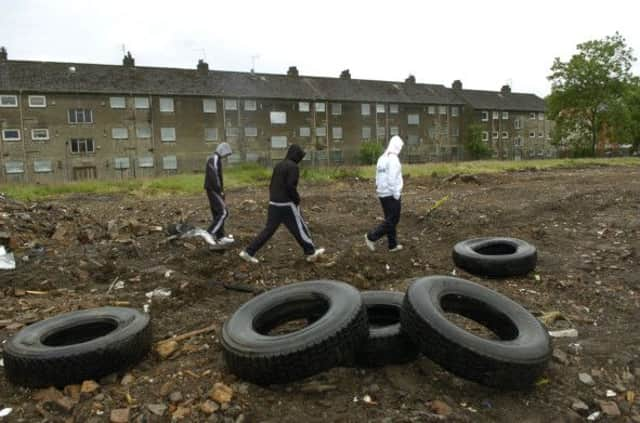Dani Garavelli - Outrage missing for poverty porn


It would have been unrealistic to expect anything more from Rachel Johnson, former editor of The Lady magazine and sister of Boris. Even so, it was galling to read her breezy recounting of her sojourn with a family who are struggling to put food on the table. Johnson was taking part in the BBC’s latest slice of poverty porn Famous, Rich And Hungry, a TV show which involves stripping already-diminished human beings of the last vestiges of their dignity to give celebrities an insight into what it means to live hand to mouth. And it served its purpose.
Johnson says she now understands why poor people are fat and feels guilty when she thinks about how much food the £3 she spends on a flat, white coffee could buy. Although, as she wittered on about her friends’ envious response to her “poverty safari”, she sounded about as “chastened” as a busted banker haggling for a bigger bonus.
Advertisement
Hide AdAdvertisement
Hide AdElsewhere, self-proclaimed prankster “Magic of Rahat” found a “nice” homeless person (well, you wouldn’t want to help “nasty” one) and gave him a “winning” lottery ticket which he cashed in for $1,000. The twist was Rahat was secretly filming the man so the world could witness first-hand how desperately, pathetically grateful he was for one act of generosity in his otherwise awful life (even though that act turned out to be another form of exploitation).
Still, the thousands who viewed the clip got to feel better about themselves because they had teared up at the humanity of it all. How therapeutic it must have been for them to experience catharsis at “Eric’s” expense before heading off to the pub.
That’s the way it is with poor people on TV these days: they’re either the objects of public scorn – see Benefits Street – or public pity.
But where has all the righteous anger gone? Johnson and the YouTube voyeurs shouldn’t be merely “moved” by the plight of these people, they should be outraged: outraged at a society in which top earners are given tax breaks, while the vulnerable have their benefits cut, and outraged at a government which feels no shame that an affluent country such as ours should have tens of thousands of its citizens dependent on food banks.
Some people are angry, of course, particularly those trying to catch those who have fallen through the gaps. There are the eight charities who last week warned that, with 870,000 of its citizens now living in food poverty, Scotland is facing a humanitarian crisis. And the 43 church leaders who had the audacity to suggest welfare reforms were responsible for the widespread destitution.
And all those who give sustenance to those who would otherwise go hungry. They tell of families mortified at having to ask for help, but still David Cameron insists the proliferation of food banks is driving demand as opposed to the other way round.
Last week, a Panorama documentary cast a different light on the situation. It showed Jobcentres were being encouraged to increase the number of people sanctioned for allegedly falling foul of the rules to save money. Depending on the alleged offence, these claimants’ benefits can be stopped for up to three years. Though those affected have the right to appeal – last year about 6,500 appeals were upheld – they are expected to live on fresh air until their case is resolved.
Yet there’s no real anger on the part of Westminster politicians. Certainly not on the part of the Tories, who want to make people stand on their own two feet. And not on the part of Nick Clegg, who accused the Archbishop of Westminster, Cardinal Vincent Nichols of exaggerating the impact of welfare reforms. Ed Miliband – with his plans for an energy price freeze and tax breaks for firms which pay a living wage – may talk the talk, but with one eye on the middle class vote, one wonders if he’ll walk the walk.
Advertisement
Hide AdAdvertisement
Hide AdFor those in the Yes camp, all this is grist to the mill in the argument for independence. Who wants another helping of the status quo? Not me, especially as we have been warned of more cuts to come. Since the Scottish government is powerless to change things while welfare is reserved, why would anyone vote No? (Unless, perhaps, they gave a toss about the fate of English people too.)
The problem is I don’t detect much righteous anger on the part of politicians north of the Border either. With all minds focused on 18 September, the independence debate has become a funnel through which all other issues are filtered.
Policies which speak to social justice – such as free school meals and universal child care – appear to have become a means by which to secure independence rather than the other way round (and remember Alex Salmond has refused to commit himself to reinstating the 50p tax rate). Campaigners and pundits compete for soundbites, while the queues at the country’s food banks grow.
Away from the white noise of Holyrood, many people are struggling to survive and it is third sector organisations, charities and the churches – not distracted politicians – who are doing most to improve their lot. As MSPs lob insults at First Minister’s Questions, is it any wonder the referendum sometimes feels more like a political game than an opportunity to change the destiny of Scotland for the better? As both sides flaunt their tribalism and their twibbons while doing little to alleviate the crisis in their midst, is it any wonder so many people are failing to engage? «
Twitter: @DaniGaravelli1